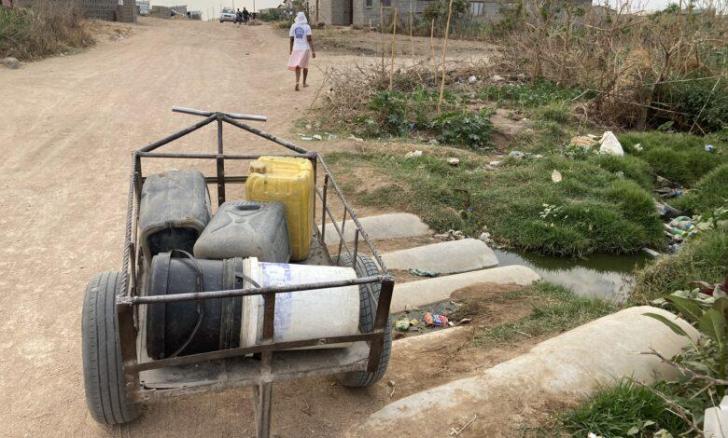News / National
BCC launches major effort to clear clogged sewer pipes
22 Feb 2025 at 11:59hrs |
0 Views

In response to growing public concern over frequent sewer blockages, the Bulawayo City Council (BCC) has launched an extensive programme aimed at clearing the city's clogged sewer pipes, which have long been a source of health hazards. The initiative, which involves collaboration with four companies, comes after widespread outcry from residents regarding the state of the city's sewerage system.
Ward 25 councillor Aleck Ndlovu confirmed the move, stating that the blockages, which have plagued the city for years, had been causing pipe bursts and sewage overflow, particularly in areas where the sewer system had been severely impacted. "The exercise has been ongoing ever since the public outcry. Four companies are working with BCC to clear all the filth choking the sewer system in the city," Ndlovu explained.
The councillor also revealed disturbing allegations that some residents may be deliberately blocking the system for personal gain. "Some of our residents are said to be deliberately choking the system by throwing materials so that they can use sewage to water their vegetable gardens. Others are removing the metal manhole covers for scrap metal deals," Ndlovu said. These actions, he added, have exacerbated the crisis, contributing to the blockage of vital sewage infrastructure.
Residents of Bulawayo have long voiced their concerns about the persistent sewer blockages, which continue to present significant health risks. Ndlovu, who has been vocal about the issue, pointed to the ongoing water shortages in the city as a major contributing factor. "The long water-shedding hours have caused the sewer blockages to escalate," he said, urging residents to be more cautious in maintaining their drainage systems. He specifically called on mothers to stop disposing of disposable diapers in the drainage system, as they were contributing to the problem.
The issue of sewer blockages and pipe bursts has become more pressing as the city grapples with aging infrastructure. In 2022, Bulawayo councillors proposed the hiring of community plumbers to help address sewage pipe bursts more effectively. However, concerns over the stringent requirements for hiring plumbers, including the need for motor vehicles and plumbing equipment, have delayed progress. Councillor Silas Chigora suggested that these requirements should be relaxed to facilitate quicker responses to emergencies.
The city's ageing water and sewage reticulation infrastructure has been a persistent problem, with an estimated US$500 million needed over the next 20 years to upgrade the system. According to council minutes, the increasing number of sewage pipe bursts could lead to outbreaks of waterborne diseases like cholera. Currently, the council is struggling with manpower shortages, which result in delays in addressing pipe bursts, leaving many areas without prompt repairs.
The situation has become dire in some suburbs, where raw sewage flows into homes, creating further exposure to waterborne diseases. In 2020, a diarrhoea outbreak in Luveve resulted in 13 deaths and affected many others, with the outbreak attributed to the contamination of potable water by sewage from burst pipes.
As the city faces these ongoing challenges, the Bulawayo City Council's new initiative is seen as a crucial step toward addressing the city's sewerage and water infrastructure issues. However, residents remain hopeful that further investments in infrastructure upgrades and improvements in maintenance can help prevent future outbreaks and enhance the city's sanitation standards.
Ward 25 councillor Aleck Ndlovu confirmed the move, stating that the blockages, which have plagued the city for years, had been causing pipe bursts and sewage overflow, particularly in areas where the sewer system had been severely impacted. "The exercise has been ongoing ever since the public outcry. Four companies are working with BCC to clear all the filth choking the sewer system in the city," Ndlovu explained.
The councillor also revealed disturbing allegations that some residents may be deliberately blocking the system for personal gain. "Some of our residents are said to be deliberately choking the system by throwing materials so that they can use sewage to water their vegetable gardens. Others are removing the metal manhole covers for scrap metal deals," Ndlovu said. These actions, he added, have exacerbated the crisis, contributing to the blockage of vital sewage infrastructure.
Residents of Bulawayo have long voiced their concerns about the persistent sewer blockages, which continue to present significant health risks. Ndlovu, who has been vocal about the issue, pointed to the ongoing water shortages in the city as a major contributing factor. "The long water-shedding hours have caused the sewer blockages to escalate," he said, urging residents to be more cautious in maintaining their drainage systems. He specifically called on mothers to stop disposing of disposable diapers in the drainage system, as they were contributing to the problem.
The city's ageing water and sewage reticulation infrastructure has been a persistent problem, with an estimated US$500 million needed over the next 20 years to upgrade the system. According to council minutes, the increasing number of sewage pipe bursts could lead to outbreaks of waterborne diseases like cholera. Currently, the council is struggling with manpower shortages, which result in delays in addressing pipe bursts, leaving many areas without prompt repairs.
The situation has become dire in some suburbs, where raw sewage flows into homes, creating further exposure to waterborne diseases. In 2020, a diarrhoea outbreak in Luveve resulted in 13 deaths and affected many others, with the outbreak attributed to the contamination of potable water by sewage from burst pipes.
As the city faces these ongoing challenges, the Bulawayo City Council's new initiative is seen as a crucial step toward addressing the city's sewerage and water infrastructure issues. However, residents remain hopeful that further investments in infrastructure upgrades and improvements in maintenance can help prevent future outbreaks and enhance the city's sanitation standards.
Source - southern eye
Join the discussion
Loading comments…


































